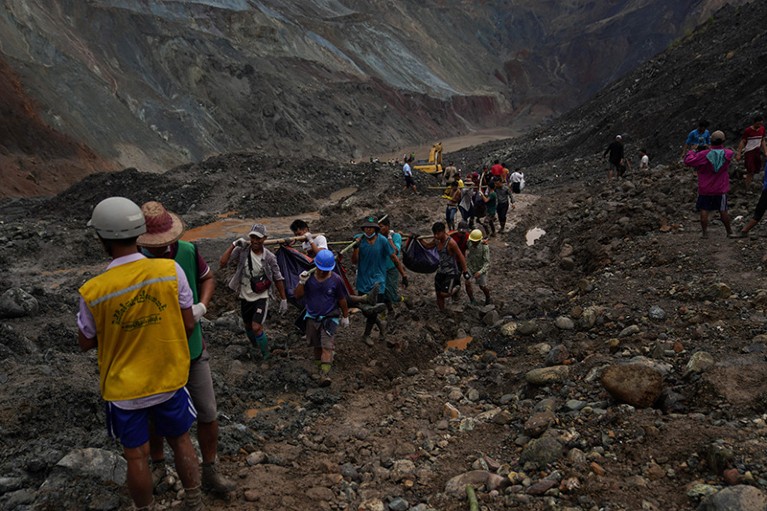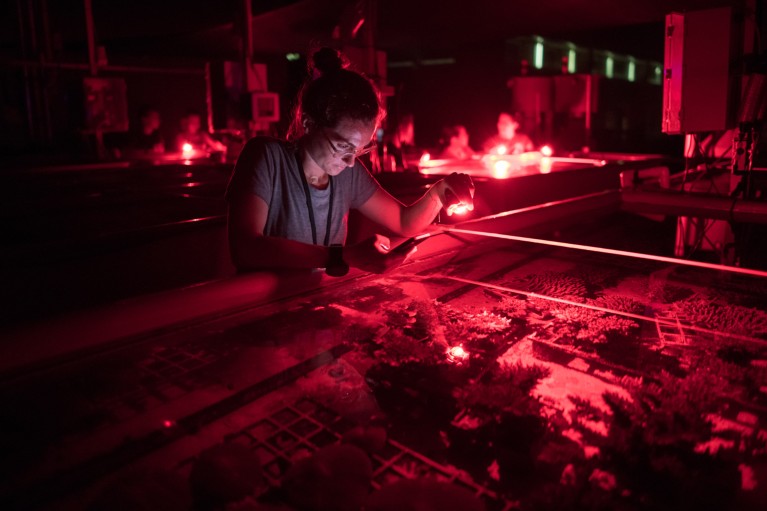Hello Nature readers, would you like to get this Briefing in your inbox free every day? Sign up here.

Hundreds of people were buried by a landslide when the wall of the Wai Khar open mine collapsed on 2 July 2020.Credit: Zaw Moe Htet/AFP via Getty
What caused deadly Myanmar mine disaster
The first study to rigorously document a mining accident in Myanmar suggests that mismanagement and poor design contributed to the tragedy — not simply monsoon rains, as was initially assumed. An international team of researchers analysed satellite and remote-sensing data of the Wai Khar jade mine, where a landslide last July killed more than 170 people. The authors hope that — in addition to shedding light on the causes of the disaster, which have not yet been fully resolved — the findings will aid documentation of mine collapses and improve site planning, both in Myanmar and in other countries that see frequent mining accidents.
Reference: ISPRS Journal of Photogrammetry and Remote Sensing paper
Black scientist network celebrates successes
In the wake of global protests against anti-Black racism last year, a movement — now known collectively as Black in X — emerged to celebrate Black scientists and fight systemic oppression in academia. Black In X leaders tell Nature that they are proud of how their collective efforts have helped to amplify the voices of Black scientists, but there is still much work to be done to dismantle oppression in science — which will require direct action by institutions. “The onus is not on us to fix racism in the academy,” says materials chemist Samantha Theresa Mensah. Leaders and participants will discuss these issues and more at a virtual conference organized this week by a network of more than 80 groups.
Heatwave scorches Pacific Northwest
A heatwave in western Canada and the northwestern United States has shattered temperature records — and it’s not even the hottest time of year in the region. The record for the highest temperature ever in Canada was broken two days in a row this week in the town of Lytton. The peak — 47.9 ℃ — is unheard of in a region where the typical June average high temperature is 24 ℃. “The opening act has arrived of a climate catastrophe,” said Washington governor Jay Inslee.
CNN | 7 min read & CBC | 6 min read
Features & opinion
Why become an academic administrator
“We all have heard the common wisdom at universities: administration is the realm of failed academics,” writes geneticist Juergen Reichardt. Less is written about how to have a happy career in research administration and leadership — and why you might want one. Reichardt outlines the rewards of an administrative leadership stint for academics who wish to serve others, better their own institutions, engage with society across borders and further the impact of research.
Where I work

Kate Quigley is a research scientist at the Australian Institute of Marine Science outside Townsville, Queensland.Credit: Juergen Freund
Every October or November, over a few specific nights, corals in the Great Barrier Reef release many millions of eggs and sperm into the waters off Queensland, Australia, during a mass spawning event. “My research brings this action indoors to Australia’s national sea simulator,” writes integrative molecular ecologist Kate Quigley. “In this photo, taken in November 2019, I am eagerly peering into the tank because the big dance is about to happen.” Quigley and her colleagues aim to determine whether selectively breeding corals in land-based nurseries can help to boost the creatures’ ability to survive global warming. “Selective breeding can buy us time to get the reef’s problem under control, but it is no silver bullet,” notes Quigley. “Heat tolerance from natural genetic variation will run out if the temperature continues to spiral upward.”(Nature | 3 min read)
